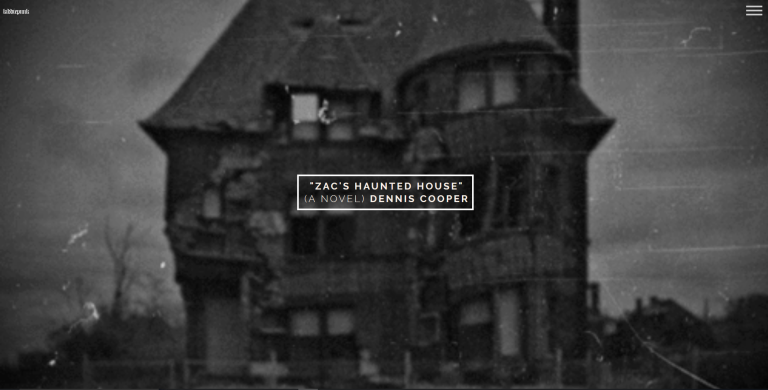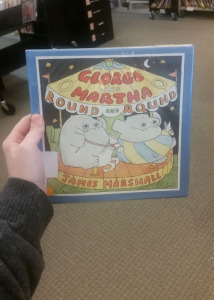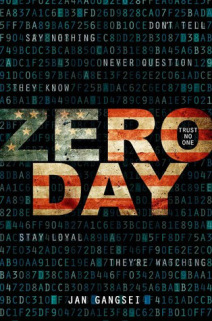On a whim I went to the blog I had not checked in on in a long while, only to find there was no blog. Everything had been replaced with a page stating that the blog had been closed down for violating terms of use. This was not in and of itself surprising: transgressive artists should expect to face censorship challenges. It would not be anything remarkable if not for what happened after. Things disappear off of the internet all the time. The real puzzle was the reason behind the disappearance, as well as the complete absence of a warning that this would happen.
Dennis Cooper’s blog, The Weaklings, has been a wonderful place for those who wanted to find alternative representations of reality–a few degrees removed, darker than midnight. It is an alley many could walk down, and then quickly walk away from if (when?) it became too much. Eros and Thanatos are not just connected in the Universe of Dennis Cooper–they are permanently in each other’s arms, in the darkness of a corner room, open to each other and engaged in a perpetual state of procreation. The romance of Cooper’s most delicate and meaningful love affairs (the most tender one I have encountered yet would be in his graphic novel, Horror Hospital Unplugged, 1993) is always tainted by the reality that in a heteronormative world, in a world which promotes its dominance, its “rightness” by making these desires criminal, the ostracized queer will go on to become a criminal, to attract the darkness to them. To criminalize the queer is to make them a self-fulfilling prophesy. This is not some new dimension of fetish reduced through pornography, this is where desires hold both liberation of the self and the traps of social consequence. This is the territory of Jean Genet’s sailors on a phallic ship, where the structure of society is reworked.
Through high school, Dennis Cooper was the reason I cleared my browsing history before my parents could look something up on the computer.
Cooper’s blog is the only place where you can find detailed prose-poems about male escorts and the world of rent boys hooked on drugs and masochism, and esoteric and obscure reflections on the history of art, sensational crimes, transgressive and punk writers from the tradition Cooper helped initiate, and long lists of elaborate decorations or images, often without commentary, centralized around a theme. My personal favorite was a series of Halloween decorations that ranged from the mildly gross and humorously creepy to the outright traumatic, represented through a series of demonstration videos and .gif sets. Cooper’s interest is the only thing connecting it all. In many ways, The Weaklings was a darker corner of Tumblr before Tumblr existed. In my first year of college, I found a magazine called PYWSM?!? And in that exchange met a beautiful man who gave me hope for queer people hoping to create art outside of the rainbow paradigm. I discovered the films of Pasolini and the plays of the mad spiritual Artaud. The blog offered Cooper fans a place to interact with the author, in the form of a “PS” at the end of each post. Cooper responded to almost every person who left comments, and used the section as an opportunity to promote young artists he admired.
[Cooper, in an interview with Hilda Magazine, talks about his publishing history, including a large section about the composition of a blog post, including a discussion of the “PS”]
And one day it all disappeared. Cooper went public with his story about the removal of his blog and the deletion of his account, which cost him years of work, including a novel in progress. It was a moment that could have easily shattered another artist and forced them to close up shop. To lose a work in progress is one thing, to lose an archive at the same time is to feel as though your work never existed in the real world. I was reminded of the incident early in Hemingway’s career, in which he famously lost a trunk full of manuscripts, or the drunken remarks that Capote had finished Answered Prayers and put the book in a locker, where it has yet to be found. The lost work always holds out hope and dread. These are the moments in which the artist has to choose whether to continue working or to abandon their efforts. Following international outcry, the account, along with the blog, was returned to Cooper, with almost as little explanation as its disappearance. All that is left is speculation.
The Weaklings, or DC’s [NSFW] as it is now called, can be described in its new incarnation as an art project moving in two directions: a restoration of the lost material of the blog that Cooper originally wrote and published for over a decade, in addition to new posts, creating a space where the past and the future are unfolding at the same time. This archiving/creating project moves in conjunction with Cooper’s turn towards the digital form, exploring what writing means in a digital landscape. From his early career in the zine scene of the 1980s to his most recent print novel, The Marbled Swarm (2011), Cooper has focused on the breakdown and manipulation of language. The digital landscape has given him a new avenue to explore.
 A screenshot of the Title Page for “Zac’s Haunted House” a “GIF-Novel” by Dennis Cooper
A screenshot of the Title Page for “Zac’s Haunted House” a “GIF-Novel” by Dennis Cooper
Zac’s Freight Elevator, published online by Kiddiepunk.com right after the blog controversy, is the third in a series of highly experimental works composed entirely in .gif images. These works are freely available on the Internet, either as downloadable packages or as things you can scroll through on your web browser of choice. To call these works novels is to present them within a particular context that the genre hounds among us might find uncomfortable or unsatisfactory. They are, after all, wordless, and who created a wordless novel? (Lynn Ward and his woodcuts, perhaps, but no matter.) These works are exactly what you would expect from Dennis Cooper: dark, occasionally funny, twisted, disturbing, filled with images that will stick with you long after reading. The only difference is these are actual images, not representations of visual events in words. Each text is made up of film clips, music videos, spinning rock lyrics, advertisements, and oddities found throughout the web. The images short-circuit what we have come to expect from literature. It is, of course, the case that many of these images are tapping deep into your unconsciousness, sending signals not unlike the signals from the telegraph device featured in the preface to Zac’s Haunted House [NSFW], the first of his “GIF-Novels.” Imagine a silent film without title cards or music to accompany the action.
I read Zac’s Haunted House, in about 15 minutes. Reading is, I realize, a somewhat dishonest term–not because the book is wordless but because I scrolled through, not wanting to look, even as I kept going. It is traumatizing, a horror film you watch through parted fingers. Even still, there are moments of tenderness hidden in the work. Comfort is to be found in the arms of another man, even if this other man could also betray you and send you spiraling, as men so often do in Cooper’s work. There is love, but it is fleeting, snatched away before it can be turned into something sentimental.
These works dependent on the archival and collaborative nature of the internet. Each consists of found image sets, rearranged to create movement and contrasting scenarios. This is a new kind of storytelling that grew out of the blog space, one that lets readers create the context between images and situations. There is no specific plot. It takes the gaps of experience (the life we live between Facebook posts) and makes that the narrative structure. With each new work in this form, the form itself develops, resulting in a smoother, more finessed experience of Cooper’s juxtapositions. In a time when many of us scroll on by, Cooper has adapted to the scroll and made it part of his work.
It is in these narratives that Cooper is finding ways to present the world to readers anew. Like his prose fiction, it is dark and frightening, but it is also able to contain moments of great tenderness. It is the radical honesty Cooper demonstrates by placing his work in the world, that makes his blog and his novels in a new media form into avenues worth exploring in our digital wonderland before they are blocked off.
Did you enjoy this article? Consider subscribing to TERSE. for as little as $1 a month: https://www.patreon.com/TERSE
Advertisements Share this:




